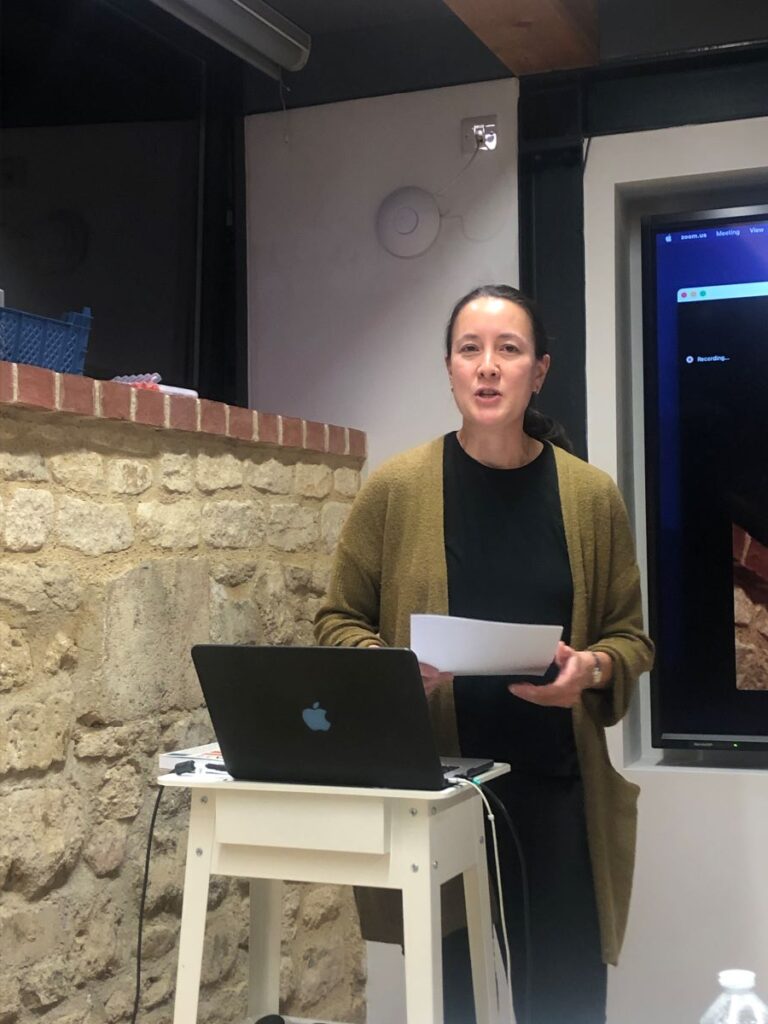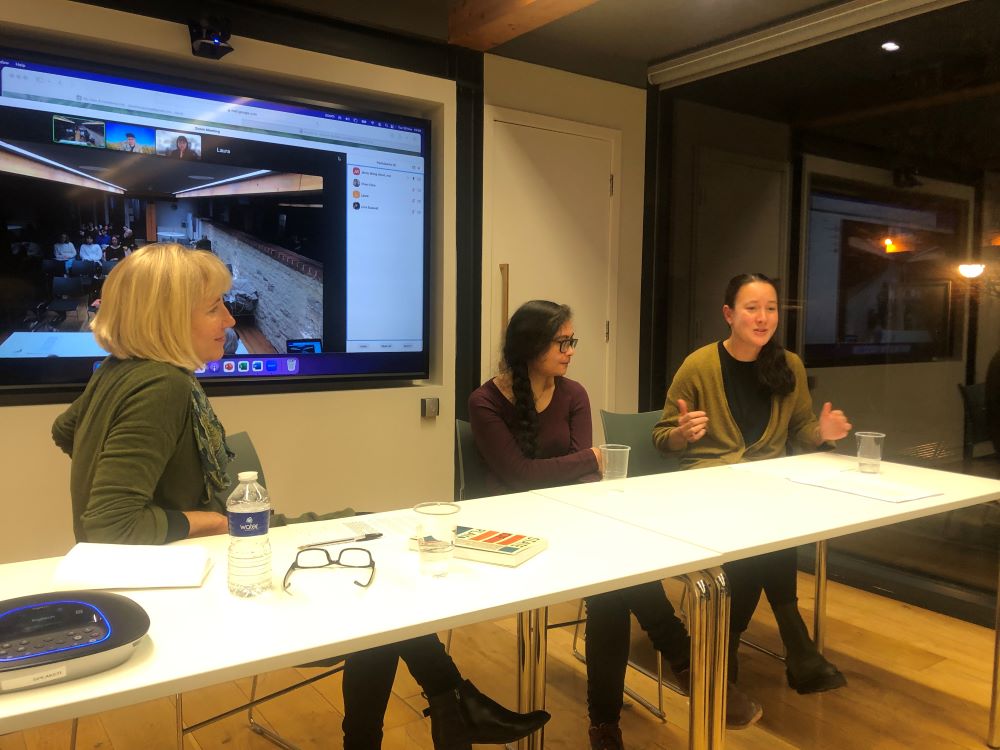Rethinking cultural identity and belonging: East and Southeast Asian Poets writing in and beyond Britain
Jennifer Wong
Cited in the preface to the State of Play: Poets of East and Southeast Asian Heritage in Conversation anthology (Outspoken Press, 2023), leading British-Jamaican critic-scholar Stuart Hall suggested that cultural identity is ‘a matter of ‘becoming’ as well as of ‘being’. It belongs to the future as much as to the past. This idea is pervasive across Writers Make Worlds, but in these days of global citizenship and cultural diaspora, it also relates specifically to diasporic Asian identity which is open-ended and subject to change. Indeed, looking only at Britain today, ‘it is impossible to fully encompass the complexities of Asian identities.’[1]
Instead, the conversations in the book open up spaces to initiate exchanges among poets who identify as Asians, to encourage ‘accepting the complexity and diversity’ and appreciate ‘what they care about, write about, struggle with, or call out against.’ For example, in the conversation between Sarah Howe, author of Loop of Jade (2015) and Monica Youn, author of from from (2023), the task of writing about race and racialised experiences is addressed with searing honesty, and ranges from the complexity of the lyrical self to the writing of dailiness and motherhood.
Conversations in the book are generated from a diasporic community of Asian poets, as they corresponded with each other across continents and generations, sharing their thoughts on many levels: from languages, the meaning of home, gender and racial identities, to the craft of writing and their everyday life. Not only did the anthology lead to more visibility for the work of these Asian poets in Britain, it has also brought their works into dialogue thematically, highlighting the relationship between the works of minority writers and the ‘mainstream’ British literary canon. Moreover, the anthology makes space for discussing taboos and challenges these Asian poets face collectively. As US-based Chinese-Scottish poet and author of Imperium, Jay Gao, puts it in the book: ‘We’re allowed gratitude, glee, pride, cheer, joy—all tempered, or marbled, by some degree of modesty. What gets discussed far less, at least in public, is the private discomfort and alienation.’
On 28 November 2023, Professor Elleke Boehmer moderated a special reading and launch conversation in Oxford with some of the State of Play contributors including Sarah Howe, London-based Vietnamese-Chinese poet Natalie Linh Bolderston, joined by Asian-American poets Chen Chen and Lora Supandi. The poets reflected together on shared themes, including their complex, sometimes contradictory sense of belonging and racial heritage, their connections with the languages they grew up with, and the themes they feel compelled to write.


Amplifying the conversation further, to mark the LGBQT+ history month in February 2024, the English Faculty at the University of Oxford added a digital companion to the anthology, featuring short interviews and excerpts of conversations from the book with the anthology LGBQT+ contributors. As they noted, their sense of belonging in Britain is complex, because in addition to their racial and cultural belonging, their LGBQT+ identities also matter deeply. Therefore, the process of writing for the anthology prompted several of the poets to rethink their artistic work and the intersectional spaces in their writing, and how their work contributes to or finds a home in the contemporary literary scene. In particular, we see how individual Asian poets have always been readers themselves, and form part of the literary discourse, such as Kit Fan whose literary influences include Bishop, Wilde and Highsmith.
Born and raised in the Philippines before moving with his family to the UK in 2007, Troy Cabida noted in his contribution that we need to acknowledge the challenge that exists in writing about desire. On a personal level, the dynamics of sharing his writing and life journey in the anthology has also led him to reconsider the importance of being Asian and queer as formative experiences. At the same time, the experience of belonging to a writing community such as the one gathered between the covers of State of Play, has been helpful to him in becoming bolder and more playful in his expressiveness as a poet.
A Nepalese writer who studied English at Oxford, Mukahang Limbu published his first pamphlet, Mother of Flip-flops (2022) at the age of 20. For Mukahang, his creative practice involves finding space within and beyond migration: ‘for all the different facets that are not so separate; my mother, my father, being a migrant, boyhood, growing up, superstitions, softbois, and being gay can all fit in one poem.’
In a number of Asian countries or city-states such as Hong Kong, China and Singapore, the attitude towards LGBQT community is still conservative and queerness is regarded as subversive, morally dubious or controversial. Against this background, one can more fully appreciate the boundary-pushing nature of the works by these minority writers and the impact of migration on their creative work. As Marylyn Tan, Singapore-based poet and the first-ever female winner of Singapore Literature Prize, remarked, the anthology contribution has led to a new ‘space for re-discovering the community in an intimate and informal fashion’. She also notes how much she enjoys ‘the simple and mere fact of epistolary.’
As from the conversation between Asian-American poet Yanyi, author of Dream of the Divided Field (One World, 2022) and The Year of the Blue Water (2019) and the UK-based Hong Kong-Chinese poet Mary Jean Chan, author of Bright Fear (2023) and Flèche (2019), writing is a way of embracing the unknown, hidden parts of oneself. Yanyi concedes that ‘each one is the new poem you wanted to write that you didn’t know how to write.’ For Chan, having their book gifted or included in libraries or someone’s book collection is a way of feeling or being seen, and this sense of belonging is especially precious because, as a queer writer, they grew up in a society with far fewer models for their queer poetics.
In the dialogue between Chen Chen, author of Your Emergency Contact Has Experienced an Emergency (2022) and Lora Supandi, Stanford graduate of Indonesian heritage, one becomes aware of how many painstaking struggles and epiphanies emerge from excavating meaning within different forms of relationships, including familial relationships, friendships and romantic love. In Chen Chen’s letter, he wrote: ‘Ache knows how to find us. Maybe because ache is life, too, alongside non-ache. They are neighbours.‘ In writing about pain, therefore, these writers also discover and acknowledge the necessity to celebrate or chronicle joy that exists alongside grief, and how those feelings will shape them as writers of colour.
[1] Eddie Tay and Jennifer Wong, Editors’ Preface in State of Play: Poets of East and Southeast Asian Heritage in Conversation (Outspoken Press, 2023), piii-iv.
Cite this: Wong, Jennifer. “Rethinking cultural identity and belonging: East and Southeast Asian Poets writing in and beyond Britain.” Postcolonial Writers Make Worlds, 2024, https://writersmakeworlds.com/essay-wong-state-of-play. Accessed 7 May 2024.
